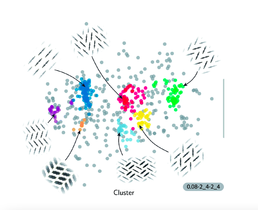Seminar 23rd February 2022 1 p.m. Online
Building a computational engine to guide the autonomous discovery of molecular materials
Graeme Day
University of Southampton
- Web page
- https://www.southampton.ac.uk/chemistry/about/staff/gmd1a11.page
- Categories
- Machine learning, NGCM
- Submitter
- Monica Freeman
The talk will describe progress in the development of a computational framework to guide the discovery of functional crystalline molecular materials. Many materials properties of interest in applications, such as porosity or charge transport, are strongly influenced by the arrangement of molecules in the solid state. However, the structures of molecular crystals are often determined by a delicate balance of weak, competing interactions between molecules. Therefore, small changes in chemical structure can lead to large changes in crystal packing and empirical rules for predicting the arrangement of molecules often fail. Thus, our approach to the computational discovery of materials is built around the core technology of crystal structure prediction (CSP), which has developed into a reliable tool for exploring the likely crystal structures associated to a given molecule. When targeting a given function, we assess the relevant properties for this landscape of potential crystal structures, providing what we call an energy-structure-function (ESF) map [1].
After discussing recent examples of how CSP and ESF maps have been used to guide experimental programmes for materials discovery, I will describe how we have started to integrate CSP with methods for chemical space exploration, principally using population-based evolutionary approaches [2]. This presents several challenges before we can fully automate the exploration of the joint chemical-crystal structure space, including the need to accelerate the CSP methods and to automate the interpretation of ESF maps for identifying the best target molecules for synthesis and characterisation. These are areas where we have made use of supervised and unsupervised machine learning [3,4], which will be described and discussed.
References
[1] Functional materials discovery using energy–structure–function maps, A. Pulido et al, Nature 2017, 543, 657.
[2] Evolutionary chemical space exploration for functional materials: computational organic semiconductor discovery, C. Y. Cheng, J. E. Campbell and G. M. Day, Chemical Science 2020, 11, 4922-4933.
[3] Machine learning for the structure–energy–property landscapes of molecular crystals, F. Musil, S. De, J. Yang, J. E. Campbell, G. M. Day and M Ceriotti, Chemical Science 2018, 9, 1289-1300.
[4] Machine-Learned Fragment-Based Energies for Crystal Structure Prediction, D. McDonagh, C.-K. Skylaris and G. M. Day, Journal of Chemical Theory and Computation 2019, 15, 2743–2758; Multi-fidelity Statistical Machine Learning for Molecular Crystal Structure Prediction, O. Egorova, R. Hafizi, D. C. Woods and G. M. Day, The Journal of Physical Chemistry A, 2020, 124, 8065–8078.
Professor Graeme Day joined the University of Southampton in 2012. As a member of the Computational Systems Chemistry research group, his research develops computational methods for materials discovery and prediction of the crystal structures.
“I’m excited by the promise of predictive computational methods for transforming the way that we discover new materials.”
This seminar will take place via Microsoft Teams on Wednesday 23 February 2022, starting at 13:00
Our seminars are primarily online events via Microsoft Teams but we will reintroduce some on campus events following current University guidelines – watch out for the calendar invitations and please join us. If you do not receive an invitation but would like to attend one of our seminars then please contact us.
Visit: ngcm.soton.ac.uk
